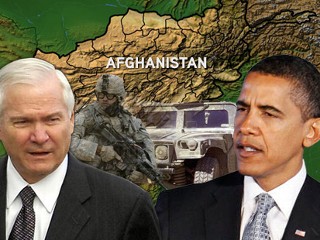
President Obama has stumbled into several chess games simultaneously. He cannot win them all. Today, he addresses the U.N. Security Council.
Barack Obama is experiencing a time-lapse presidency. After only eight months in office, he has scaled heights that many of his predecessors were unable to duplicate even in four years. But now he has arrived in the valley of tears and his presidency is in trouble.
Obama is facing weeks, if not months, of testing. People will not be able to judge whether he has the stature he was thought to have until this period is over. Obama the presidential theoretician now has to become Obama the presidential practitioner.
When Obama proposed his ambitious agenda at the beginning of his term, he was often compared to a chess master who had the confidence to play several games simultaneously. But just after the opening moves, it has become apparent that he cannot win some of these matches.
Thus, we are left with that hollow feeling that there is far too much distance between his glowing words concerning an ideal world and America’s role in it and the results he thus far can show us.
Afghanistan is the toughest foreign policy burden he has to face. Friction developed quickly between the general officers in command in Iraq and Afghanistan and the current political leadership.
The military – Chairman of the Joint Chiefs Mullen, Iraq war hero Petraeus and his foster son McChrystal – is well versed in the publicity game and has developed a stubborn streak. Nine years of war has resulted in a new claim to military leadership and one need only look at the tactical plans within the Defense Department to realize that its clout far exceeds that of the State Department.
The power shift has, as one would expect, produced a backlash among traditional foreign policy adherents, the most prominent being Vice President Joseph Biden. That Obama’s second in command has publicly more or less put the military in its place and has brought out an Afghanistan/Pakistan strategy diametrically opposed to the current one has resulted in further pressures on the president and is rare even for Washington. In the end, it also points out Obama’s leadership weakness after he announced his new Afghanistan strategy with great aplomb just six months ago and now has to retreat under fire from two sides, including his own ranks.
Driving the debate over the military is, as is so often the case in American politics, the domestic agenda, specifically the fight over healthcare reform. Obama’s most important domestic reform project produced a shift in the balance of Washington power this summer that has breathed new life into the opposition.
Suddenly, Congress is back in the midst of the battle and the president sees the simple truth of the idea that what goes around comes around. Whoever is pressured, duped or sees himself ignored gets a chance for revenge – as in the matter of Afghanistan or environmental policy.
The military leadership has to worry that Obama may bow to congressional pressure and refuse a troop increase in Afghanistan. Opposition to an increase in both houses of Congress reflects public discontent with the Afghanistan war.
In order to get the president’s backing, the generals ignited a fire in which they now find themselves trapped. Between both fronts stands a secretary of defense who swore an oath of loyalty to the president. He could be the first victim of the conflagration.
But the war has also uncovered other weaknesses. Security Advisor Jim Jones is nowhere to be seen – especially not anywhere near his boss. Secretary of State Clinton rarely appears on camera.
She has yet to make an appearance in Europe – where not only the Eastern European governments feel betrayed by the president’s missile shield decision, but where even the shield’s political opponents in the West have to wonder whether Obama had to call in favors for his noble gesture to scrap the project, either from Russia or Iran.
Thus Obama’s presidency races forward: an awkward photo-op with the Near East antagonists, an Obama procrastinating on environmental negotiations, challenged both by Congress and the Pentagon. Obama, a politician who seems to be all talk and no action.
But this is just the beginning of Obama’s crisis, not the end. Behind Obama’s much-vaunted coolness there is supposedly a will of iron. Anyone able to display such stamina and finesse during a political campaign surely will not have forgotten how to play the political game now that he is in office.
But the time for grandiose speeches and noble pleas has passed. A UN speech full of pathos and emotion only comes off as ridiculous when everyone sees your own roof is ablaze. Obama will have to show the world toughness and courage if he wants to be taken seriously.

Leave a Reply
You must be logged in to post a comment.